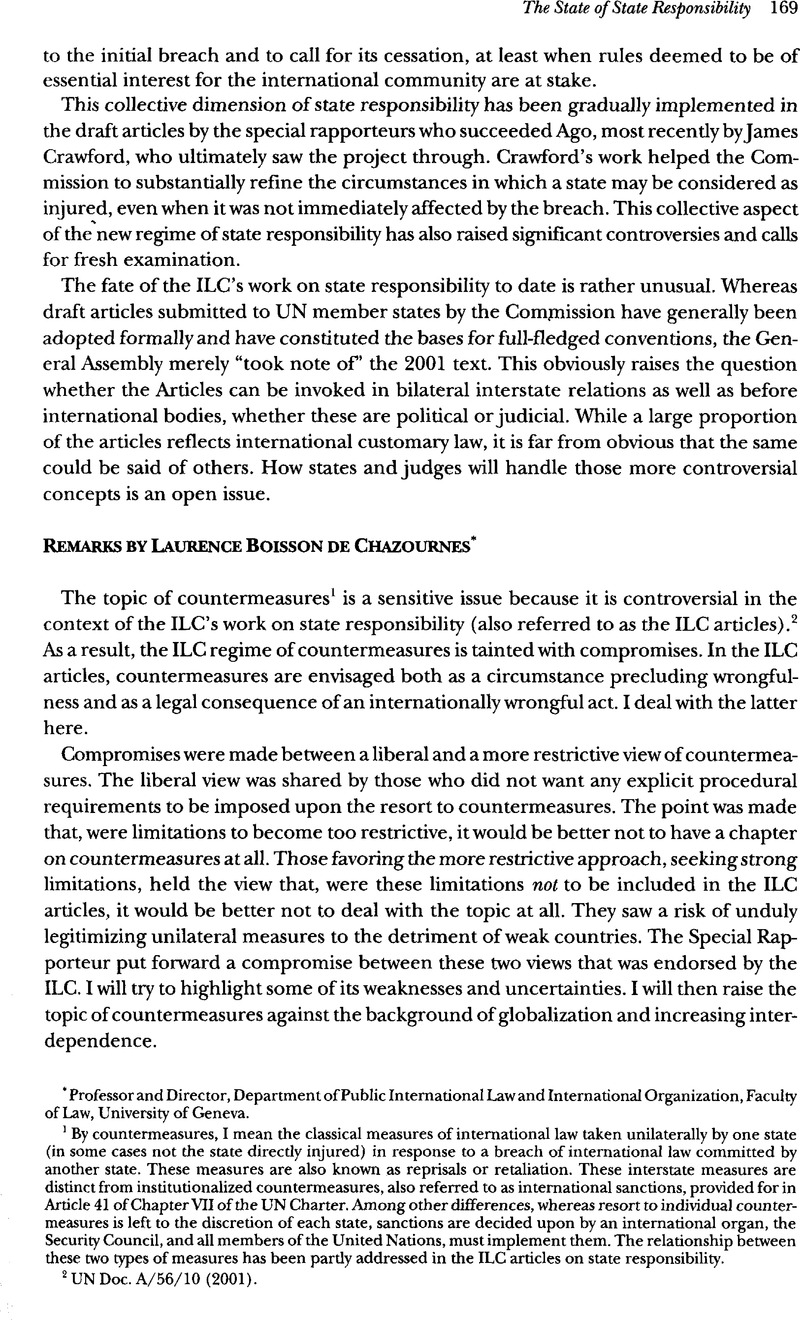No CrossRef data available.
Article contents
Remarks by Laurence Boisson de Chazournes
Published online by Cambridge University Press: 28 February 2017
Abstract

- Type
- The State of State Responsibility
- Information
- Copyright
- Copyright © American Society of International Law 2002
References
1 By countermeasures, I mean the classical measures of international law taken unilaterally by one state (in some cases not the state directly injured) in response to a breach of international law committed by another state. These measures are also known as reprisals or retaliation. These interstate measures are distinct from institutionalized countermeasures, also referred to as international sanctions, provided for in Article 41 of Chapter VII of the UN Charter. Among other differences, whereas resort to individual counter-measures is left to the discretion of each state, sanctions are decided upon by an international organ, the Security Council, and all members of the United Nations, must implement them. The relationship between these two types of measures has been partly addressed in the Ilc articles on state responsibility.
2 UN Doc. A/56/10 (2001).
3 “Counter-measures may not be taken, and if already taken must be suspended without undue delay if:. . . (b) the dispute is pending before a court or tribunal which has the authority to make decisions binding, on the parties.”
4 See, e.g., Understanding on Roles & Procedures Governing the Settlement of’ Disputes, April 14, 1994, 33 ILM 1226, 1239 (1994). The complainant yet may seek authorization from the WTO Dispute Settlement Body (DSB) “to suspend the application to the Member concerned of concessions or other obligations under the covered agreements.”
5 James Crawford, the International Law Commission’s Articles on State Responsibility, Introduction, Text and Commentaries 53 (2002).
6 Article 52, para. 2 reads: “Notwithstanding paragraph 1(b), the injured State may take such urgent countermeasures as are necessary to preserve its rights”.
1 On this risk of the invocation of necessity, see de Chazournes, Laurence Boisson, Unilateralism and Environmental Protection: Issues of Perception and Reality of Issues, 11 Eur. J. Int’l L. 315, 334 (2000)CrossRefGoogle Scholar.
8 Crawford, supra note 5, at 53.
9 Relevant here is the commentary to Article 40, which states “[i]n the light of the International Court’s description of the basic rules of international humanitarian law applicable in armed conflicts as ‘intransgressible’ in character, it would also seem justified to treat these as peremptory.” UN Doc. A/56/10 (2001) at 284, para. 5.
10 Article 17 reads: “The invocation of a circumstances precluding wrongfulness in accordance with this Chapter is without prejudice to ... (b) the question of compensation for any material loss caused by die act in question.” UN Doc. A/56/10 (2001) at 209.
11 Mat 181.
12 Id. at art. 50, para. 1.
13 Id. at article 51.
14 Gabcikovo-Nagymaros Project (Hung./Slovk.), 1977 ICJ Rep. 7, 80 at para. 147 (Sept. 25).
15 Id. at 56, para. 85.
The Court considers that Czechoslovakia, by unilaterally assuming control of a shared resource, and thereby depriving Hungary of its right to an equitable and reasonable share of the natural resources of the Danube—with the continuing effects of the diversion of these waters on the ecology of the riparian area of the Szigetköz—failed to respect the proportionality which is required by international law,
Id.
16 Crawford, supa note 5, at 40-41.
17 See Charnovitz, Steve, Rethinking WTO Trade Sanctions, 95 AJIL 792, 830 (2001)CrossRefGoogle Scholar.




